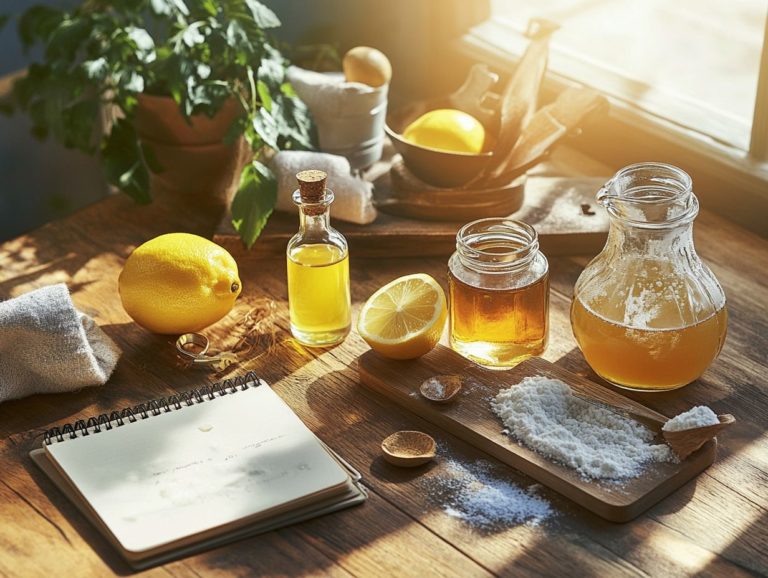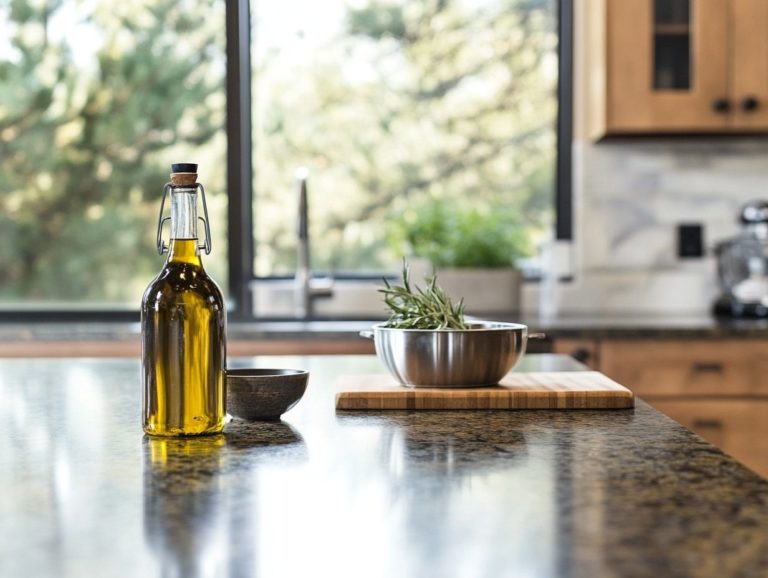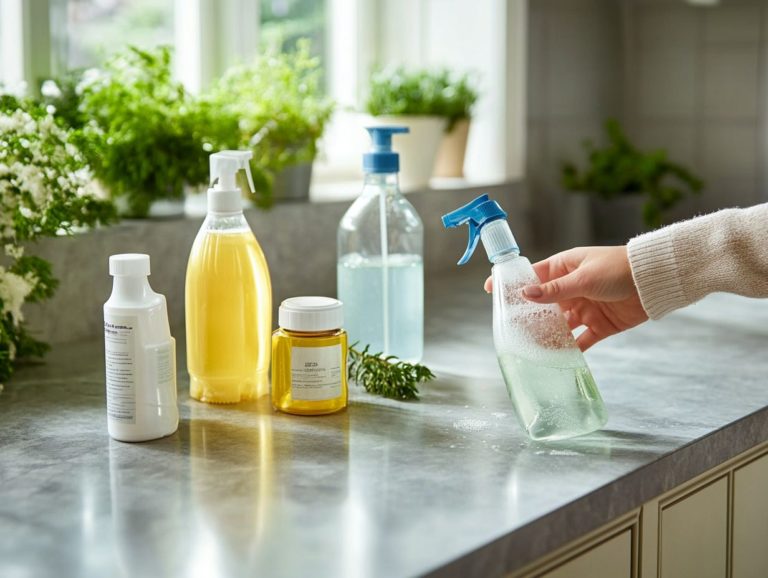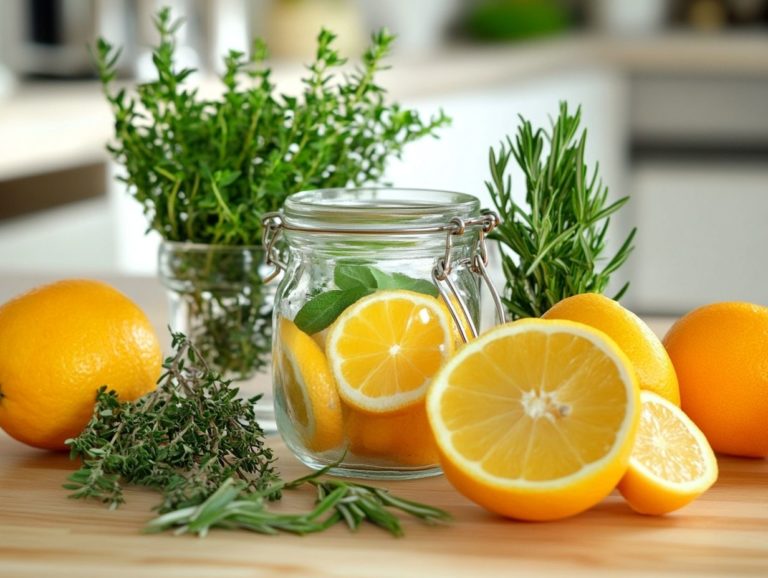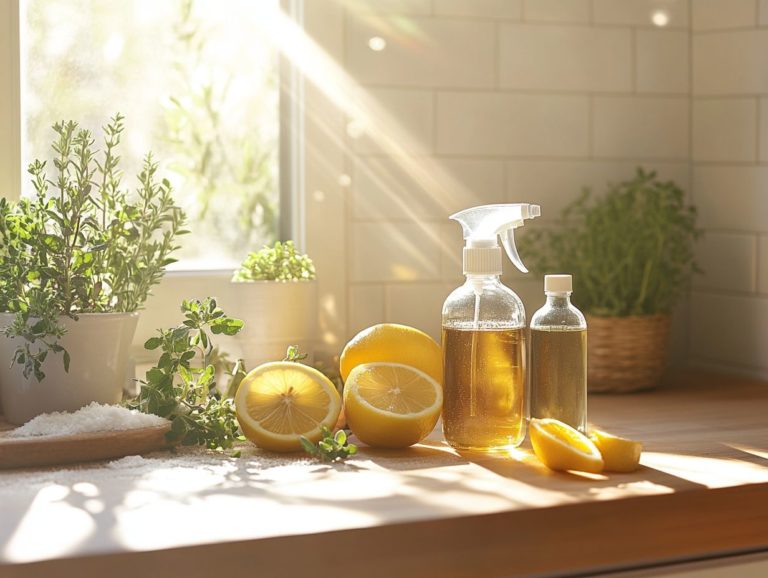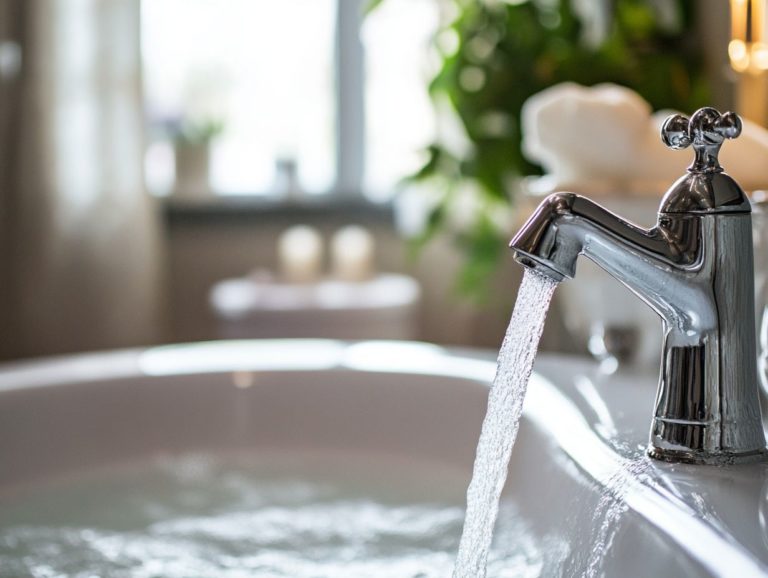Can I Use Essential Oils in DIY Cleaners?
As you seek eco-friendly and safe cleaning solutions, essential oils have emerged as an exceptional choice for your DIY cleaners. Not only do they infuse your space with delightful fragrances, but they also boast an array of antibacterial and antiviral properties that enhance your cleaning power, promoting a non-toxic environment.
Discover the amazing health benefits of using essential oils in your cleaning routine! This article highlights the best oils tailored for various tasks and shares effective recipes for creating all-purpose, glass, disinfectant cleaners, and air fresheners.
The article also provides essential safety tips and alternative ingredients, such as household and natural cleaners, to ensure your cleaning efforts are both effective and secure.
Embark on this journey into the world of essential oils and discover how they can elevate your cleaning experience to new heights!
Contents
- Key Takeaways:
- What Are the Benefits of Using Essential Oils in DIY Cleaners?
- Which Essential Oils Are Best for Cleaning?
- How to Use Essential Oils in DIY Cleaners?
- Are Essential Oils Safe for Cleaning?
- What Are the Alternatives to Essential Oils in DIY Cleaners?
- Frequently Asked Questions
- Can I Use Essential Oils in DIY Cleaners and home remedies?
- Which essential oils are good for cleaning?
- How do I use essential oils in DIY cleaners and home remedies?
- Are essential oils safe to use in DIY cleaners?
- Can I mix different essential oils in DIY cleaners?
- What are the benefits of using essential oils in DIY cleaners?
Key Takeaways:
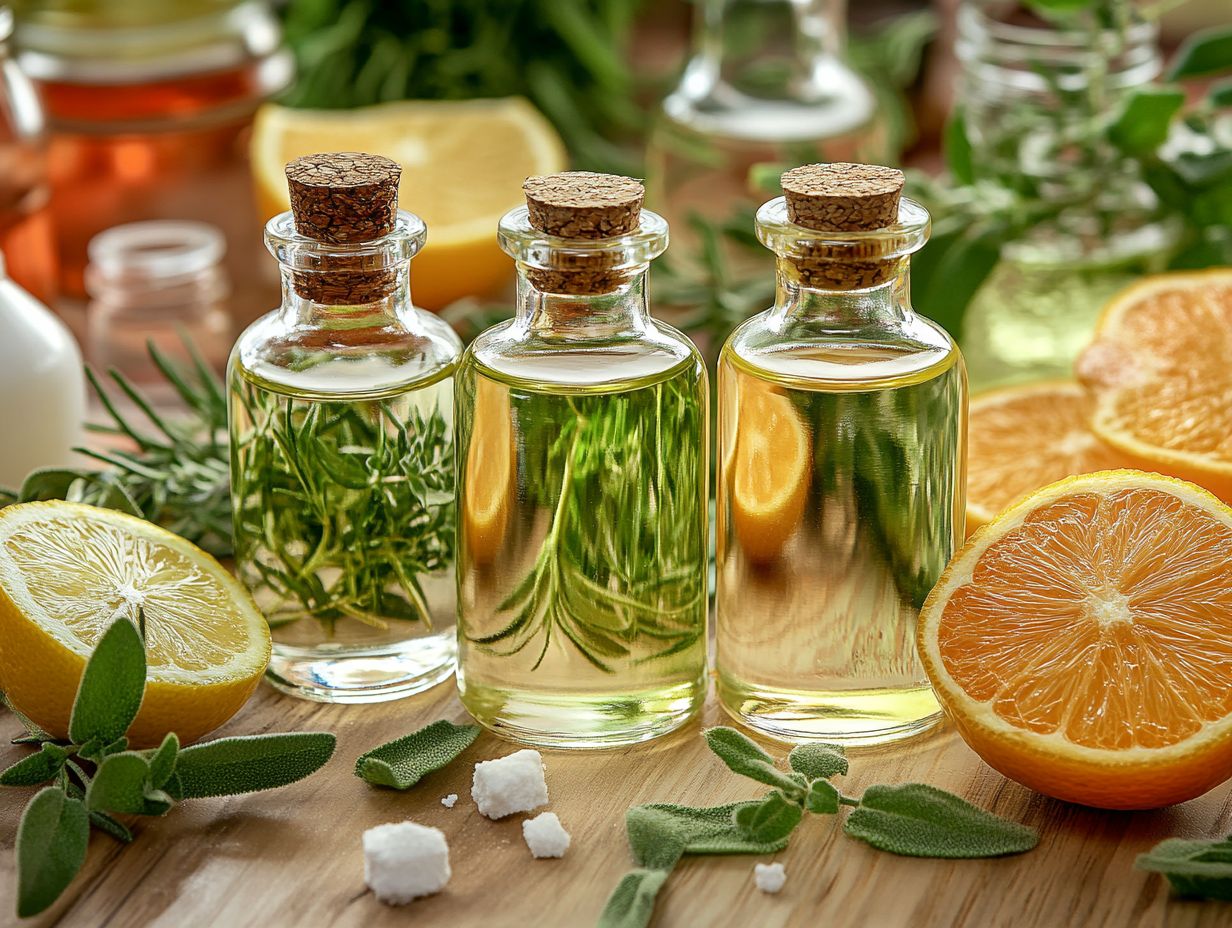
- Essential oils can bring added benefits to DIY cleaners, such as natural fragrance and antibacterial properties.
- Lemon, tea tree, lavender, and peppermint essential oils are effective and versatile options for cleaning.
- When using essential oils in DIY cleaners, proper dilution, safe storage, and caution with certain oils are important for safety and effectiveness.
What Are the Benefits of Using Essential Oils in DIY Cleaners?
In addition to cleaning, essential oils can be used in skincare products, hand sanitizers, and toilet cleaners, ensuring a complete method for your home remedies.
Incorporating essential oils into your DIY cleaning solutions not only fosters a non-toxic environment but also brings a wealth of health benefits that can elevate your home cleaning experience. These oils possess antibacterial properties, effectively combating harmful microorganisms while bolstering your immune system and providing digestion support.
By adding essential oils such as lavender, lemon, eucalyptus, rosemary, and tea tree oil to your routine, you can enhance your mood, alleviate anxiety, and even gain an energy boost. This transforms your everyday chores into a therapeutic ritual that nurtures your well-being.
Which Essential Oils Are Best for Cleaning?
When selecting the finest essential oils for your cleaning endeavors, you’ll discover that certain oils truly shine with their remarkable antimicrobial and antibacterial properties. Oils such as lemon, tea tree, lavender, and peppermint not only exude delightful fragrances but also elevate the efficacy of your cleaning efforts.
These essential oils can be seamlessly integrated into your daily cleaning rituals, allowing you to maintain a fresh and healthy home environment free from harmful chemical ingredients.
1. Lemon Essential Oil
Another great option for cleaning is citrus oils like wild orange and grapefruit, which provide similar benefits.
Lemon essential oil is celebrated for its bright, invigorating scent and potent antibacterial properties, making it a standout choice for your natural cleaning regimen. Its remarkable ability to cut through grease and grime while infusing your space with a refreshing aroma brings an enjoyable touch to any cleaning routine.
Not only does lemon essential oil serve as an effective cleaning agent, but it also fosters an uplifting atmosphere in your home, creating an ideal environment for a sparkling kitchen.
This versatile oil can be seamlessly blended with ingredients like white vinegar and baking soda to craft effective, eco-friendly solutions for tackling stubborn stains and disinfecting surfaces.
For instance, when you combine lemon essential oil with vinegar, you create a formidable cleaner that not only eradicates bacteria and mold but also neutralizes unpleasant odors. Alternatively, when paired with baking soda, lemon oil amplifies the scrubbing power needed for cleaning sinks and countertops, leaving them not only spotless but also delightfully fragrant.
Its natural antibacterial and antifungal properties make it an essential choice for anyone seeking a safer, more effective approach to home cleanliness.
Start making your own DIY cleaners today and experience the difference!
2. Tea Tree Essential Oil
Also known as melaleuca, tea tree oil is a staple in many sustainable economy practices due to its effectiveness and eco-friendly nature.
Tea tree essential oil stands out as a germ-fighting ingredient. It is an outstanding choice for anyone seeking effective cleaning solutions without harsh chemicals. Its remarkable ability to combat bacteria, mold, and mildew makes it an essential ingredient in your homemade household cleaners. By incorporating tea tree oil, you ensure a clean space while promoting a healthier indoor environment free from toxins.
Integrating this essential oil into your cleaning routine can significantly elevate both the safety and effectiveness of your efforts. Combine a few drops of tea tree oil with water and vinegar, and you’re just a few drops away from a powerful all-purpose cleaner that tackles grime while disinfecting surfaces. A blend of tea tree oil with baking soda creates a natural scrub for sinks and countertops, effortlessly eliminating stubborn stains and neutralizing odors.
The invigorating scent of tea tree oil not only refreshes your living space but also fosters a calming atmosphere, enhancing your overall well-being.
3. Lavender Essential Oil
Lavender is not only beneficial for cleaning but also for reducing anxiety and improving mood, making it a versatile choice.
Lavender essential oil is celebrated for its calming aroma and remarkable versatility in a variety of cleaning applications. Incorporating this essential oil into your cleaning routine helps reduce anxiety and promotes relaxation, transforming your home into a haven of serenity. Using lavender in natural cleaners or air fresheners allows you to create a tranquil environment that feels both welcoming and refreshing.
Integrating lavender into your DIY cleaning products is simple and incredibly rewarding. Mix a few drops of lavender essential oil with vinegar and water, and you can craft an effective surface cleaner that cuts through grime while infusing your space with its delightful fragrance. You can also create a homemade air freshener by combining water, vodka, and lavender oil in a spray bottle, offering a refreshing alternative to commercial sprays.
Adding lavender to your laundry detergent imparts a soothing scent, ensuring that your linens deliver a calming ambiance every time you use them. This dual-purpose approach leads to a cleaner space while enhancing your overall well-being.
4. Peppermint Essential Oil
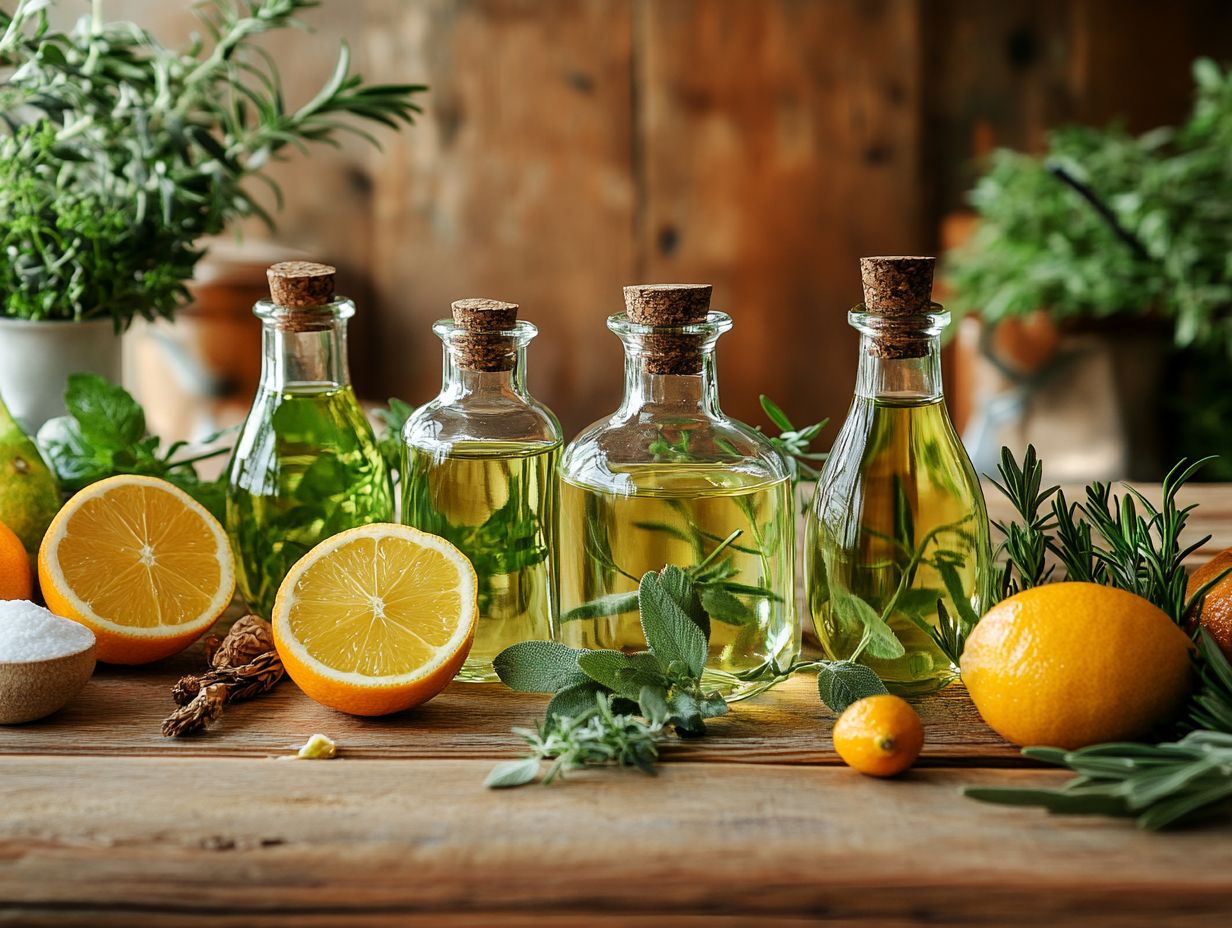
Peppermint oil can be combined with other essential oils like clove and cinnamon to create a protective blend for added cleaning power.
Peppermint essential oil is known for its invigorating scent and impressive antibacterial properties, making it a superb addition to your cleaning routine. Its potential as an energy booster can turn the mundane task of cleaning into a delightful and refreshing experience.
By integrating peppermint oil into your DIY cleaning solutions, you harness its powerful cleaning capabilities while cultivating an uplifting atmosphere that brightens your living space. Add this delightful oil to your homemade surface cleaners, where its natural antibacterial qualities effectively eliminate germs, leaving your surfaces immaculate and pleasantly scented.
For an extra boost of freshness in your laundry, add a few drops of peppermint oil during the rinse cycle to invigorate your fabrics. Don t forget about your home s ambiance using a diffuser with peppermint oil fills your space with a fresh, zesty aroma that energizes your mood.
Blend peppermint oil with vinegar for a formidable glass cleaner that ensures your windows gleam brilliantly while infusing your home with a delightful aromatic essence.
Start using these essential oils today to transform your cleaning routine!
How to Use Essential Oils in DIY Cleaners?
When choosing essential oils, consider reputable essential oil brands that offer organic options to ensure the best quality.
Incorporating essential oils into your DIY cleaners transforms your cleaning experience into a rewarding and effortless endeavor. This enables you to create effective solutions that align perfectly with your preferences.
Whether you wish to whip up an all-purpose cleaner, a glass cleaner, or a powerful disinfectant spray, essential oils provide remarkable cleaning power and delightful fragrances without the dangers posed by toxic chemicals.
With just a handful of ingredients, such as natural cleaners like baking soda, white vinegar, and castile soap, you can revolutionize your cleaning routine. These ingredients are safe for use with pet-safe oils and other cleaning products.
1. All-Purpose Cleaner
Utilizing essential oils in your DIY recipes helps you create personalized cleaning solutions tailored to your needs.
An all-purpose cleaner made with essential oils is your ideal way to keep things clean while effectively tackling various tasks around your home. Blend essential oils like lemon and tea tree with natural ingredients for powerful cleaning.
This DIY cleaner reduces your exposure to synthetic substances and harnesses the remarkable properties of natural ingredients known for their cleaning prowess. For example, lemon essential oil provides a refreshing scent and its natural antifungal properties, making it ideal for kitchens and bathrooms.
Tea tree oil offers antimicrobial qualities, which help kill germs, giving you added peace of mind in spaces like children’s playrooms. Combined with the gentle scrubbing power of baking soda and vinegar’s grease-cutting abilities, this versatile solution can be used on countertops, floors, and even glass surfaces.
With a dash of creativity, explore different essential oils to customize the fragrance and benefits to suit your preferences.
2. Glass Cleaner
Glass cleaners made with essential oils not only leave windows gleaming, but also use eco-friendly ingredients that are safe for children.
Creating your own DIY glass cleaner with essential oils is a brilliant way to achieve that coveted streak-free shine while using a safe, non-toxic solution. Incorporate essential oils like lemon or eucalyptus to amplify the cleaning power of vinegar and water.
These essential oils cut through grime and add a refreshing fragrance that synthetic cleaners can t match. Lemon essential oil, known for its antibacterial properties, effectively breaks down grease and lifts dirt from surfaces. Eucalyptus adds its own antimicrobial benefits, ensuring your cleaning routine is healthier and promotes a safe environment.
When applying your homemade mixture, grab a microfiber cloth and use circular motions for the best results. This technique ensures even coverage and helps prevent streaks. For those stubborn spots, a quick spritz followed by a gentle buff can make all the difference in achieving that crystal-clear finish you desire.
Using essential oils like wild orange or grapefruit can provide immune support and reduce anxiety during your cleaning routine.
3. Disinfectant Spray
A disinfectant spray made from essential oils is your secret weapon against germs and bacteria. It keeps your home free from toxic chemicals. By blending oils like tea tree and lavender essential oil with water and vinegar, you create a powerful disinfectant spray that works wonders on various surfaces. This ensures your living space remains clean and healthy.
The journey begins with selecting high-quality essential oils known for their antibacterial and antiviral properties. For example, tea tree oil is effective against a wide range of pathogens. Lavender not only disinfects but also provides aromatherapy benefits and improves mood.
To make your spray, mix a few drops of essential oils with water and white vinegar in a spray bottle. Shake the solution well before each use to ensure the oils are perfectly combined.
This natural disinfectant can be applied to countertops, doorknobs, and even bathroom surfaces. It delivers a refreshing scent while effectively killing harmful microbes. By choosing this homemade disinfectant, you maintain a spotless environment without exposing your family to harsh synthetic chemicals. Consider using essential oils like clove, cinnamon, or rosemary for added benefits.
Are Essential Oils Safe for Cleaning?
Essential oils offer many benefits for cleaning, but it s vital to prioritize safety. This is especially important when children and pets are present in your home. Proper dilution and safe application are key to avoiding any adverse effects, such as hormone disruption or sensitivities. Using organic essential oils further ensures the safety and health benefits of your cleaning routine.
By following established guidelines for safe usage, you can enjoy the remarkable cleaning power of essential oils while protecting your family s health.
1. Proper Dilution Is Key
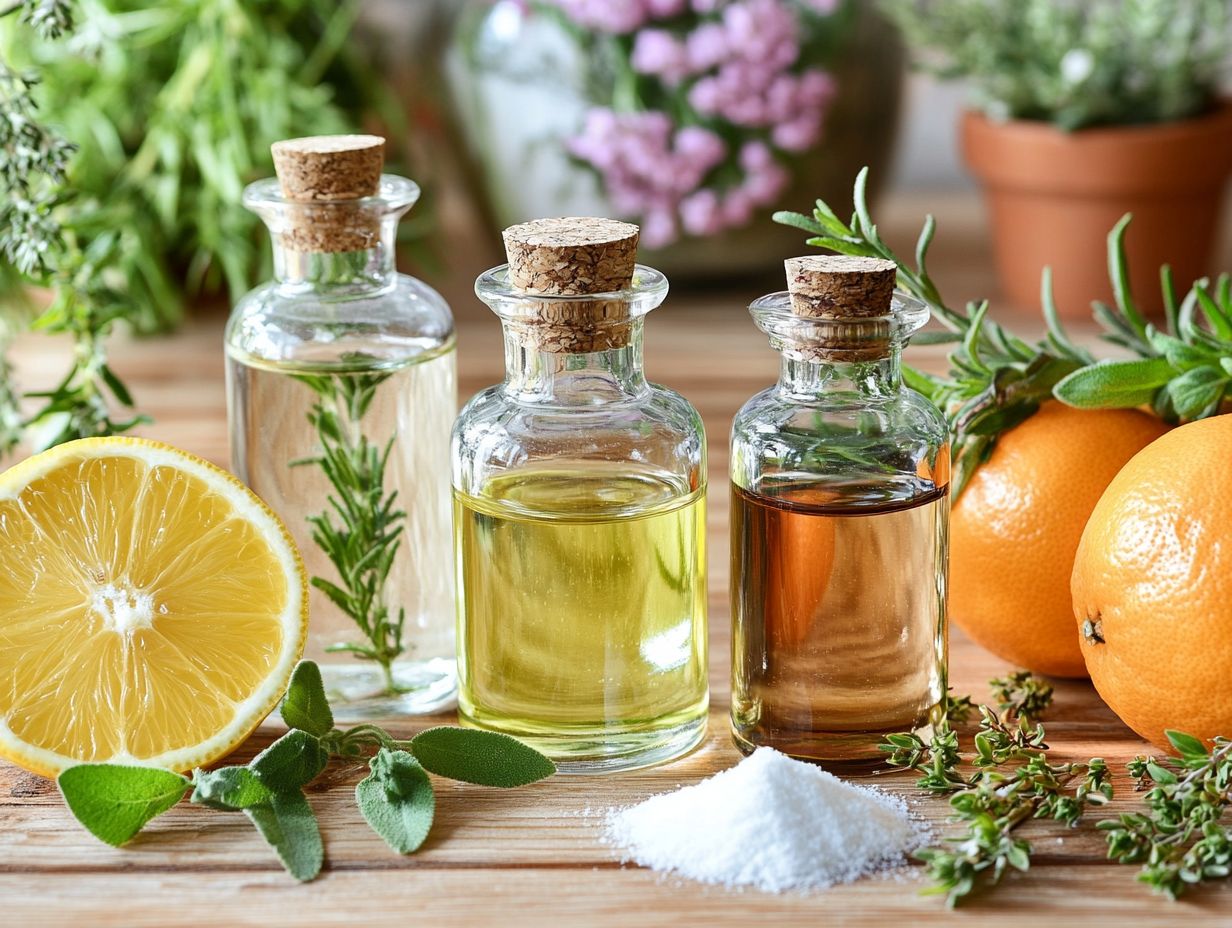
Proper dilution of essential oils is essential for their effectiveness and safety in cleaning. By mastering dilution, you unlock their full cleaning potential while minimizing the risk of irritation or adverse reactions on surfaces and skin. This practice is vital for creating a non-toxic environment in your home.
The correct dilution ratios can vary significantly based on the type of essential oil and its intended use. A common guideline suggests diluting tea tree oil at a ratio of 1-2% for surface cleaning. This strikes a balance between efficacy and safety for most skin types. In contrast, citrus oils like lemon require a more cautious approach. A dilution of 3-5% is often recommended for cleaning countertops or glass surfaces. Using protective blend essential oils can enhance your cleaning solutions.
Understanding these nuances ensures effective cleaning while preserving both personal well-being and environmental health.
2. Keep Away from Children and Pets
When using essential oils for cleaning, keep them out of reach of children and pets to avoid accidental ingestion or adverse reactions. While many essential oils are beneficial for cleaning, they can also pose risks to young ones and animals. Therefore, store them safely and use them with care in your home environment.
Some essential oils, like tea tree oil, eucalyptus, and peppermint, can be particularly hazardous. These oils may cause toxicity if ingested or applied incorrectly. Educate everyone in your household about these risks to maintain a safe living space. Proper storage is crucial consider using locked cabinets or placing these oils on high shelves to keep them out of reach.
Diluting the oils properly before use and choosing recognized safe blends can significantly reduce potential dangers. Create a family guideline for the safe use of essential oils to ensure that everyone is informed and vigilant about these powerful substances.
3. Use Caution with Certain Oils
Exercising caution with certain essential oils is crucial for ensuring your safety during cleaning routines. Some oils can act as substances that can affect your hormones or trigger allergic reactions. Therefore, it’s wise to research and select oils known for their safety in household applications, especially around sensitive individuals.
Using alternatives like castile soap in your cleaning routine can provide an effective yet gentle cleaning experience.
Oils like clary sage, fennel, and tea tree may have hormonal effects that deserve your careful consideration. When exploring alternatives, you might find that oils such as lavender and lemon are generally viewed as safer choices. They offer beneficial properties without compromising safety. Essential oils like melaleuca, wild orange, and cinnamon can also be excellent substitutes in your cleaning routine.
By understanding the balance between the advantages and disadvantages of various oils, you enable yourself to make informed decisions. Always consult guidelines on proper dilution and usage to enhance your safety. This way, you can enjoy the benefits of aromatherapy while minimizing risks for yourself and your loved ones. Utilizing essential oil brands known for their purity can also contribute to a sustainable economy and ensure the quality of your cleaning solutions.
What Are the Alternatives to Essential Oils in DIY Cleaners?
If essential oils don’t quite meet your cleaning needs, rest assured that there are several highly effective alternatives for crafting your own DIY cleaners while ensuring a safe and non-toxic environment. Ingredients like baking soda, white vinegar, and castile soap serve as fantastic natural cleaners.
1. Vinegar
Vinegar is your secret weapon in the world of natural cleaning. This time-honored solution boasts remarkable cleaning and disinfectant properties. Its natural acidity makes it adept at breaking down grease, grime, and mineral deposits, positioning it as an essential ingredient in countless DIY cleaning concoctions.
In your household, vinegar can be the ultimate choice for tackling stubborn stains and banishing unwanted odors. For instance, a straightforward blend of equal parts vinegar and water serves as an excellent all-purpose cleaner, perfect for reviving countertops, kitchen appliances, and bathroom surfaces alike. It excels at erasing soap scum and hard water stains from glass and shower doors.
However, always test a small area first to protect your surfaces! Its acidity can be harsh on natural stone surfaces like granite and marble.
2. Baking Soda
Baking soda is a powerful natural cleaner that serves as a gentle abrasive, making it perfect for scrubbing surfaces without causing any harm. Its deodorizing properties help neutralize odors, making it a go-to choice for freshening up spaces throughout your home. It is a key ingredient in many all-purpose cleaner recipes.
This versatile ingredient can be used in various cleaning applications. Whether you re creating effective scrubs for sinks, tubs, or even stovetops, baking soda has you covered. For a simple yet effective all-purpose cleaner, just mix baking soda with water to form a paste that can tackle tough stains. You can also place an open box of baking soda in your refrigerator or pantry to work wonders in eliminating unwanted smells.
Compared to harsh chemical cleaners, baking soda offers a safe and environmentally friendly alternative. With baking soda, you can create a healthier home where everyone, including your pets, feels safe and comfortable!
3. Hydrogen Peroxide
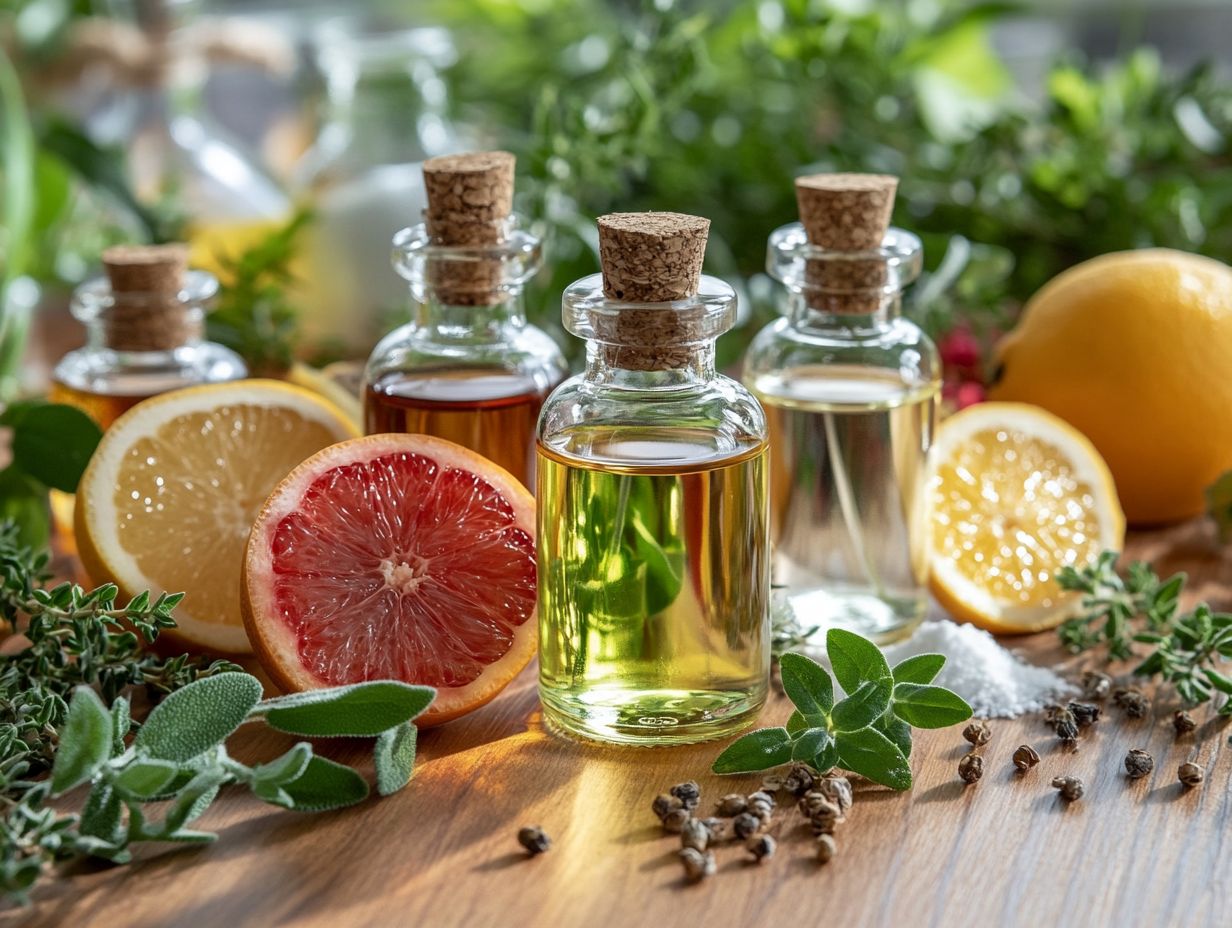
Hydrogen peroxide is your go-to natural disinfectant! It’s great for eliminating a wide array of bacteria, viruses, and fungi. This makes it a prized ingredient for your DIY cleaning projects. Its non-toxic nature means you can safely use it around children and pets, providing an effective alternative to harsh chemical disinfectants that often do more harm than good.
Plus, it s also beneficial for skin care products and home remedies. This versatile compound can easily be transformed into a variety of cleaning solutions suitable for numerous surfaces in your home. For example, whip up a simple disinfecting spray by mixing equal parts hydrogen peroxide and water in a spray bottle perfect for sanitizing countertops, cutting boards, and bathroom fixtures.
You can harness its power as a stain remover by applying it directly to the affected area and allowing it to sit for a few minutes before rinsing. Thanks to its oxidizing properties, hydrogen peroxide not only annihilates germs but also helps banish odors, leaving your spaces feeling refreshingly clean!
Store it in a cool, dark container to preserve its potency. Don t risk losing its effectiveness avoid mixing it with vinegar or other cleaners, as that could lead to undesirable chemical reactions that might produce toxic chemicals.
4. Castile Soap
Castile soap is an amazing and versatile natural cleaner you ll love! It is a key ingredient in many DIY recipes.
This biodegradable and eco-friendly natural cleaner can confidently be used on various surfaces and household cleaners, making it an exceptional choice for your DIY cleaning solutions. Its gentle formulation effectively removes dirt and grime without harsh chemicals, allowing you to embrace a healthier cleaning routine.
It s not just limited to countertops and floors; its versatility extends to personal care products, serving as an excellent body wash and shampoo as well!
For an all-purpose cleaner, mix one cup of Castile soap with a gallon of water for a powerful solution perfect for tackling everyday messes. If you’re looking for something specific, combine Castile soap, water, and citrus oils or lavender essential oil to create a delightful, fragrant window cleaner that elevates your cleaning experience. These oils add antibacterial properties to your solutions.
By choosing this natural option, you can significantly reduce chemical exposure in your household. This paves the way for a non-toxic environment that is safe for your family and beneficial for the planet!
Frequently Asked Questions
Can I Use Essential Oils in DIY Cleaners and home remedies?
Yes, you can use essential oils in DIY cleaners! They are a great natural alternative to harsh chemicals and provide additional benefits such as aromatherapy and antibacterial properties.
Which essential oils are good for cleaning?
- Lemon
- Tea tree
- Peppermint
- Lavender
- Eucalyptus
- Grapefruit
- Rosemary
- Wild orange
- Clove
- Cinnamon
- Melaleuca
These oils have powerful cleaning properties and also leave a pleasant scent!
How do I use essential oils in DIY cleaners and home remedies?
You can add essential oils to many DIY cleaners for extra benefits! Use them in recipes such as all-purpose cleaner sprays, surface cleaners, and floor cleaners. They can also be added to laundry detergent and dishwasher detergent.
Are essential oils safe to use in DIY cleaners?
In general, essential oils are safe to use in DIY cleaners as long as they are properly diluted and used in the recommended amounts. Always do a patch test and use caution when using essential oils around pets and children.
Start using these natural cleaners today and transform your cleaning routine!
Can I mix different essential oils in DIY cleaners?
Yes! You can mix different essential oils in DIY cleaners. This allows you to create a custom scent and combine their cleaning benefits.
Be sure to understand the properties of each oil. Always mix oils with water or another base to ensure safety.
For example, combining lavender and lemon can boost immune support and help improve your mood.
What are the benefits of using essential oils in DIY cleaners?
Essential oils are not just effective cleaners; they also add a delightful fragrance. They provide aromatherapy benefits and have antibacterial and antifungal properties.
You can use essential oils as an air freshener or hand sanitizer. DIY cleaners with essential oils are eco-friendly and natural alternatives to store-bought options!
By choosing these cleaners, you contribute to a sustainable economy.

